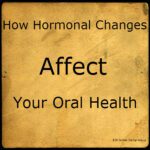
Effect of Hormones and your Dental Health
A woman, even in the 21st century, can be a delicate creature because nature has it that you have to go through a lot of hormonal changes in your lifetime. This can make you both strong and weak at the same time, especially when it comes to your oral care. Some studies today show that hormonal changes in women not only affect your mood but your dental health as well. The good thing is that while you can’t do anything about the changes of your hormones, you can take control of your oral health with the help of your dentist.
Here are facts about your hormonal fluctuations in a lifetime, from puberty to menopausal stage, and how you take care of your teeth and gums during these periods to fight off early tooth decay and gum disease developments.
During your puberty
During puberty, progesterone and estrogen or otherwise called as the sex hormones, goes in an overdrive. Your body starts making them more during puberty. With the increased production of these hormones, there is also an increased probability of developing gingivitis, also known as beginning stages of gum disease. This is a condition where gums will become tender, red and swollen and bleed quite easily. This condition develops because there are certain bacteria that thrive on these sex hormones you are producing.
The best thing you can do when you or someone you know is around this stage of growing up is to have a regular professional cleaning at least two times a year with your dentist as part of your oral hygiene regimen. Of course, brushing your teeth at least two times a day and then flossing once a day is still a must.
During your menstrual cycle
Gum problems may go unnoticed before your menstruation because these can go away once it begins. Some of oral problems you might encounter are swollen, bleeding gums, canker and cold sores. Some women may not have any of these symptoms, while some may have severe case of thee symptoms. While a healthy oral hygiene is recommended as always, you might need to apply topical solutions such as Anbesol, which is over the counter, and some pain relievers to ease severe symptoms for gum conditions during this period. And of course, regular checkup and professional cleanings from your dentist can help to keep gum conditions in check.

During pregnancy
When you are pregnant, the following gum problems have the highest probability to occur:
1. Gingivitis. There have been reports that up to 75% of women develop gingivitis during their pregnancy. This is because the probability of gingivitis occurring during this time for women increases when there is a hormonal change in the body that affects your response to irritants such as plaque. This can start at about 2 months and continue to about 8 months. Usually the gingivitis affects your gums in the area mostly.
2. Pregnancy gum tumors. Otherwise known as pregnancy granuloma are growths that are tumor like, often are purplish, red and blue that are seen in between your teeth or areas where you have tartar build up. These can grow fast up to an inch across and 10% of women who are pregnant develop this.
Other gum problems that may occur during pregnancy not entirely due to hormonal changes or might less likely occur as with the conditions mentioned above but you might still need to deal with these when pregnant:
1. Acid erosion. If you are prone to vomiting during pregnancy, this condition will likely occur.
2. Dry mouth. This is an occurrence due to the changes of your hormone during pregnancy.
3. Cavities. Women often have an increased appetite during pregnancy and a midnight snack is not a strange occurrence. Cavities happen because you might not be too motivated to brush your teeth after these snacks. During sleep, we produce less saliva and this is the perfect environment for bacteria to proliferate and cause cavities, especially if you didn’t brush after that midnight snack. Also, pregnant women tend to eat more junk food more unhealthy .
So, what should be the solution?
A healthy oral hygiene habit of brushing your teeth and flossing is still a must. It is also advisable to go to your dentist regularly especially if you have pregnancy granuloma. If you vomit a lot due to morning sickness, you should rinse your mouth with warm water mixed with one fourth teaspoon baking soda. In case of dry mouth, drinking water or having a sugarless candy may do the trick to ease your discomfort.
During Menopausal Years
When you are in your menopausal years, there is a sharp decline in your hormonal levels. This is a ten-year period where you can feel the changes of your hormonal patterns. Here, you will experience a lot of oral discomfort such as burning sensations on the gums, pain, mouth dryness, taste changes and a lot more.
Again, oral hygiene must be observed. Drinking a lot of water will help as well and taking sugarless candy will sooth your discomforts. Visit your dentist to check if other painful, burning or discomforts in your gum are hormonal related or not.
Birth Control Pills
Birth control pills can increase the inflammatory changes just like pregnancy. These changes can cause inflammation of the gums, redness and bleeding in some individuals. But the good news is that birth control pills in recent years have much less hormonal levels which has been good news for not having these gum issues.
So every stage in a women’s life that has hormonal changes can affect their teeth and gums. Here is a video for you review as well:
https://www.youtube.com/watch?v=cUoUGMZ8PAM
By: Ladan Zinati

How Water Affects Your Health | AnjumsList
September 29, 2014[…] How Hormonal Changes Affect Your Dental Health? – St. James … […]
Just how Hormonal Adjustments Influence Your Dental Health and wellness? | St James Dental Group
October 5, 2014[…] Read more about hormonal changes that affect your dental health […]
How Gum Disease And Women’s Hormones Are Associated? | St. James Dental Group
April 30, 2015[…] to add more effort on what they are doing already as there is a definite association with their hormonal changes and gum disease that is very gender specific. The idea is to lessen if not prevent these health […]